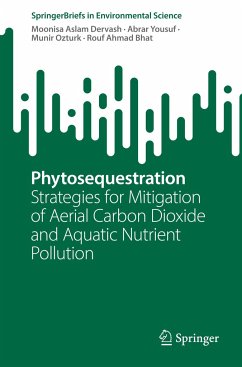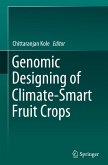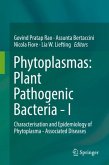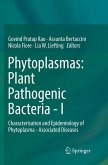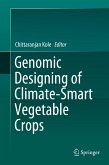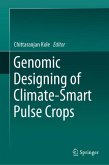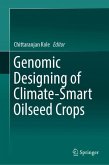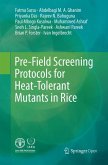Moonisa Aslam Dervash, Abrar Yousuf, Munir Ozturk
Phytosequestration
Strategies for Mitigation of Aerial Carbon Dioxide and Aquatic Nutrient Pollution
Moonisa Aslam Dervash, Abrar Yousuf, Munir Ozturk
Phytosequestration
Strategies for Mitigation of Aerial Carbon Dioxide and Aquatic Nutrient Pollution
- Broschiertes Buch
- Merkliste
- Auf die Merkliste
- Bewerten Bewerten
- Teilen
- Produkt teilen
- Produkterinnerung
- Produkterinnerung
Most imperative environmental concerns are Cultural eutrophication pertaining to industrialization and urbanization which lead to proliferation of weeds in aquatic environs disturbing these ecosystems. Alarming increase in CO 2 , CH 4 , CFC's, N 2 O and water vapour in the atmosphere cause enhanced greenhouse effect, among all these CO 2 is accountable for 55-60 % of total enhanced effect. Phyto- and Nutrient sequestration via plants helps storage of atmospheric CO 2 in the vegetation to get rid of contaminants. Carbon and nutrient sequestration can be braided together for sustainable…mehr
Andere Kunden interessierten sich auch für
![Genomic Designing of Climate-Smart Fruit Crops Genomic Designing of Climate-Smart Fruit Crops]() Genomic Designing of Climate-Smart Fruit Crops154,99 €
Genomic Designing of Climate-Smart Fruit Crops154,99 €![Phytoplasmas: Plant Pathogenic Bacteria - I Phytoplasmas: Plant Pathogenic Bacteria - I]() Phytoplasmas: Plant Pathogenic Bacteria - I154,99 €
Phytoplasmas: Plant Pathogenic Bacteria - I154,99 €![Phytoplasmas: Plant Pathogenic Bacteria - I Phytoplasmas: Plant Pathogenic Bacteria - I]() Phytoplasmas: Plant Pathogenic Bacteria - I154,99 €
Phytoplasmas: Plant Pathogenic Bacteria - I154,99 €![Genomic Designing of Climate-Smart Vegetable Crops Genomic Designing of Climate-Smart Vegetable Crops]() Genomic Designing of Climate-Smart Vegetable Crops154,99 €
Genomic Designing of Climate-Smart Vegetable Crops154,99 €![Genomic Designing of Climate-Smart Pulse Crops Genomic Designing of Climate-Smart Pulse Crops]() Genomic Designing of Climate-Smart Pulse Crops154,99 €
Genomic Designing of Climate-Smart Pulse Crops154,99 €![Genomic Designing of Climate-Smart Oilseed Crops Genomic Designing of Climate-Smart Oilseed Crops]() Genomic Designing of Climate-Smart Oilseed Crops116,99 €
Genomic Designing of Climate-Smart Oilseed Crops116,99 €![Pre-Field Screening Protocols for Heat-Tolerant Mutants in Rice Pre-Field Screening Protocols for Heat-Tolerant Mutants in Rice]() Fatma SarsuPre-Field Screening Protocols for Heat-Tolerant Mutants in Rice41,99 €
Fatma SarsuPre-Field Screening Protocols for Heat-Tolerant Mutants in Rice41,99 €-
-
-
Most imperative environmental concerns are Cultural eutrophication pertaining to industrialization and urbanization which lead to proliferation of weeds in aquatic environs disturbing these ecosystems. Alarming increase in CO2, CH4, CFC's, N2O and water vapour in the atmosphere cause enhanced greenhouse effect, among all these CO2 is accountable for 55-60 % of total enhanced effect. Phyto- and Nutrient sequestration via plants helps storage of atmospheric CO2 in the vegetation to get rid of contaminants. Carbon and nutrient sequestration can be braided together for sustainable development goals. The chapters adopt the hierarchy as follows: significance of quality environs, quantification and bio-monitoring of culprit contaminants, the issues relevant to global warming and accelerated eutrophication and their ecological impacts followed by various sequestration technologies.
Produktdetails
- Produktdetails
- SpringerBriefs in Environmental Science
- Verlag: Springer / Springer International Publishing / Springer, Berlin
- Artikelnr. des Verlages: 978-3-031-26920-2
- 1st ed. 2023
- Seitenzahl: 116
- Erscheinungstermin: 17. März 2023
- Englisch
- Abmessung: 235mm x 155mm x 7mm
- Gewicht: 189g
- ISBN-13: 9783031269202
- ISBN-10: 3031269209
- Artikelnr.: 67286654
- Herstellerkennzeichnung Die Herstellerinformationen sind derzeit nicht verfügbar.
- SpringerBriefs in Environmental Science
- Verlag: Springer / Springer International Publishing / Springer, Berlin
- Artikelnr. des Verlages: 978-3-031-26920-2
- 1st ed. 2023
- Seitenzahl: 116
- Erscheinungstermin: 17. März 2023
- Englisch
- Abmessung: 235mm x 155mm x 7mm
- Gewicht: 189g
- ISBN-13: 9783031269202
- ISBN-10: 3031269209
- Artikelnr.: 67286654
- Herstellerkennzeichnung Die Herstellerinformationen sind derzeit nicht verfügbar.
Moonisa Aslam Dervash, Ph.D. obtained her Doctorate degree from Sheri Kashmir University of Agricultural Sciences and Technology of Kashmir in the field of Environmental Sciences. She has worked as Assistant Professor in Sri Pratap College, Cluster University, Srinagar. Her specialization is in environmental monitoring, environmental awareness, ecology, soil biology, wetland restoration and carbon sequestration. She has authored more than 6 books with International publishers and has published more than 35 research articles and book chapters in the journals and books of national & international repute. Dr. Dervash has received many prestigious awards and felicitations like Bharat Excellence Award, Best Educationist Award and International Achievers Award conferred by FFI and Global forum for her dedicated accomplishments. Her focus has remained on many facets of society especially on environmental conservation and women empowerment. She has been felicitatedby state government (J & K Department of Ecology, Environment and Remote Sensing) for her outstanding contribution in environmental awareness and conservation through electronic media. Recently, she has been awarded Postdoctoral Fellowship by Ministry of Education (ICSSR), Government of India. Abrar Yousuf, Ph.D. is working as a Scientist (Soil and Water Engineering) at Regional Research Station Ballowal Saunkhri, Punjab Agricultural University, Punjab. His field of specialization is watershed hydrology, soil erosion modelling, watershed management, remote sensing and GIS, rainwater management and its judicious use and is involved in continuous monitoring of runoff and sediment yield from various watersheds in Punjab. He has participated in four research projects funded by ICAR New Delhi, DST New Delhi, GIZ New Delhi and IPRO consult Germany. Currently, he is handling two research projects as principal investigator which are being funded by Department of Soil and Water Conservation, Government of Punjab. He is working on ex-situ management of rainwater in farm ponds and its judicious use through micro-irrigation systems. Dr. Abrar has constructed farm ponds in various adopted villages. He has authored a number of technical bulletins, a book, book chapters and many research articles in journals of national and international repute; is a member of many scientific associations, has been active participant in scientific conferences, workshops, summer and winter schools, training programs for building up high scientific temper and technical skills. Recently, he has been felicitated with "Best Thesis Award" for his doctoral research work by Soil Conservation Society of India. Munir Ozturk, Ph.D., D.Sc. has served at the Ege University-Turkiye for more than 50 years in different positions, has been Founder Director of the Centre for Environmental Studies, Ege University, and Chairman of the Botany Department as well as Director of the Botanical Garden. Sideritiso zturkii and Verbascum ozturkii are 2 newly recorded endemic plant species from Turkiye in the name of Munir Ozturk. His fields of scientific interest are; pollution & biomonitoring; plant ecophysiology, biosaline agriculture; medicinal-aromatic plants conservation. Dr. Ozturk has published almost 60 books with internationally known publishers including Springer, Elsevier,Taylor& Francis, Wiley and few others. He has more than 80 book chapters and 200 papers in international journals; 120 with impact factor. Dr. Ozturk has also presented 125 papers at the International Meetings, 85 at the National Meetings and has served as a guest editor for more than 13 international journals. He holds many Memberships of "Institutions and Professional Bodies" and has received fellowships from the globally recognized Alexander von Humboldt Foundation, Japanese Society for Promotion of Science, and the National Science Foundation of the USA. Hehas also worked as consultant fellow at the Faculty of Forestry, Universiti Putra Malaysia, Malaysia; as Distinguished Visiting Scientist at International Centre for Chemical and Biological Sciences, ICCBS-TWAS, Karachi University, Pakistan; as"Vice President of the Islamic World Academy of Sciences" from 2017-2022 and is a "Fellow of the Islamic World Academy of Science" as well as "Foreign Fellow Pakistan Academy of Science". Rouf Ahmad Bhat, PhD. has pursued his doctorate at Sher-e-Kashmir University of Agricultural Sciences and Technology Kashmir (Division of Environmental Sciences) and has published more than 55 research articles, 40 book chapters, and more than 32 books with international publishers ( Springer, Elsevier, CRC Press Taylor and Francis, Apple Academic Press, John Wiley, IGI Global). His specializations include Limnology, Toxicology, Phytochemistry, and Phytoremediation. He has worked as an associate environmental expert in World Bank-funded Flood Recovery Project and also the environmental support staff in the Asian Development Bank (ADB) funded development projects; has received awards, appreciations, and recognition for his services to the science of water testing, air, and noise analysis. Dr Bhat is an editorial board member and a reviewer of reputed international journals.
Chapter. 1. Introduction to Phytosequestration - Strategies for Mitigation of Aerial Carbon Dioxide and Aquatic Nutrient Pollution.- Chapter. 2. Global Climate: Chronological Perspective.- Chapter. 3. Sources and Monitoring Tools of Atmospheric Carbon Dioxide.- Chapter. 4. Global Warming: Impacts of Temperature Escalation.- Chapter. 5. Carbon Capture and Storage.- Chapter. 6. Future Climate through the Window of Climate Models.- Chapter. 7. Societal Responses to Anthropogenic Climate Change.- Chapter. 8. Monitoring of Nutrient Pollution in Water.- Chapter. 9. Impacts of Nutrient Pollution.- Chapter. 10. Phytomediation of Nuisance Pollution.
Chapter. 1. Introduction to Phytosequestration - Strategies for Mitigation of Aerial Carbon Dioxide and Aquatic Nutrient Pollution.- Chapter. 2. Global Climate: Chronological Perspective.- Chapter. 3. Sources and Monitoring Tools of Atmospheric Carbon Dioxide.- Chapter. 4. Global Warming: Impacts of Temperature Escalation.- Chapter. 5. Carbon Capture and Storage.- Chapter. 6. Future Climate through the Window of Climate Models.- Chapter. 7. Societal Responses to Anthropogenic Climate Change.- Chapter. 8. Monitoring of Nutrient Pollution in Water.- Chapter. 9. Impacts of Nutrient Pollution.- Chapter. 10. Phytomediation of Nuisance Pollution.

